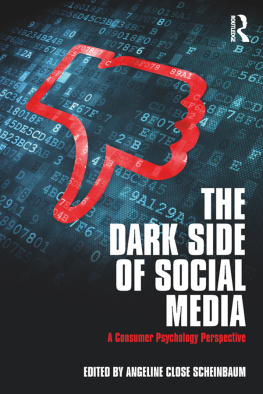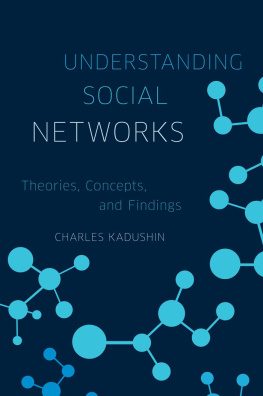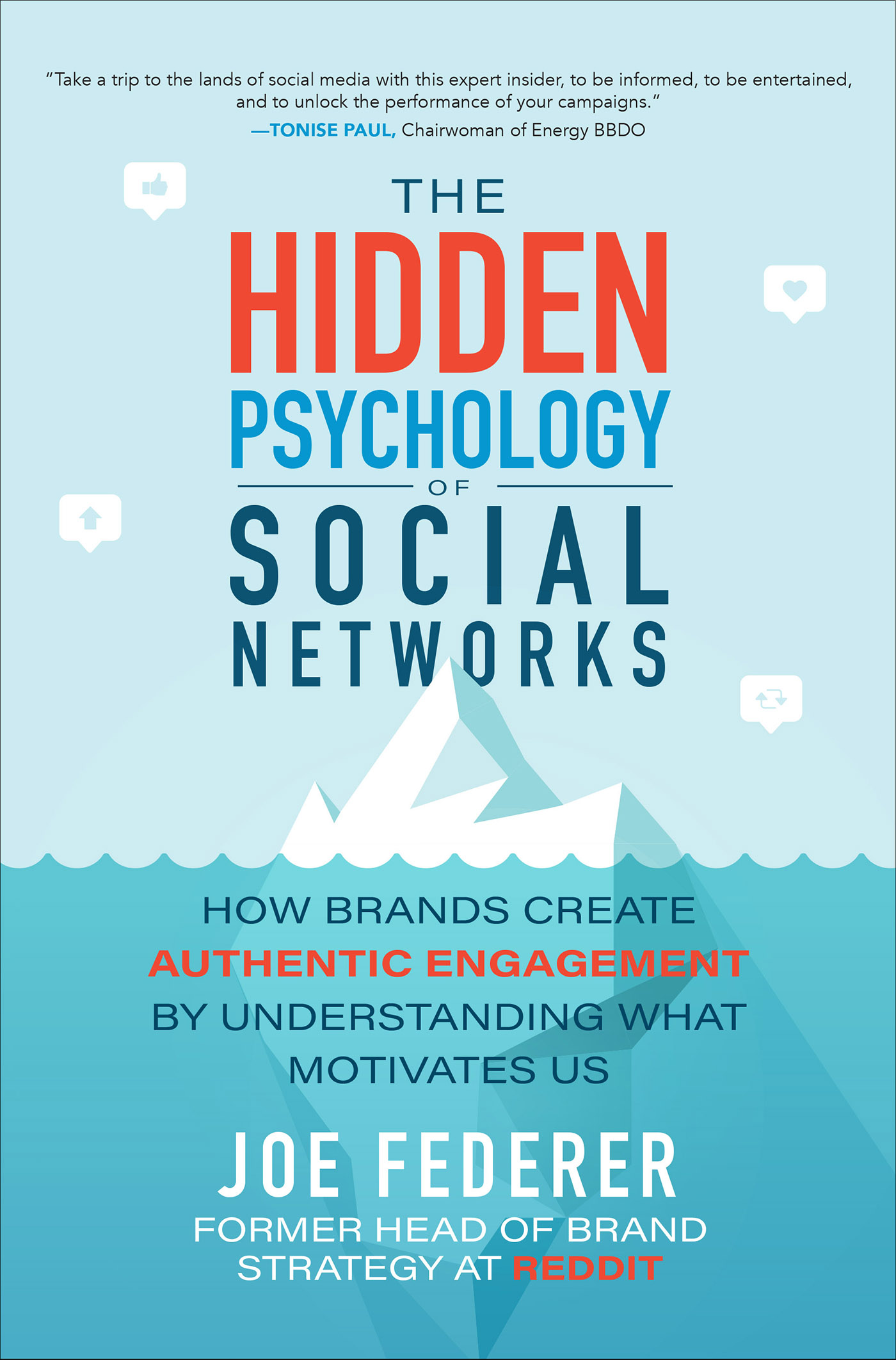Praise for
THE HIDDEN PSYCHOLOGY OF SOCIAL NETWORKS
and Joe Federer
Take a trip to the lands of social media with this expert insider, to be informed, to be entertained, and to unlock the performance of your campaigns.
TONISE PAUL, Chairwoman, Energy BBDO
Ive long held the belief that social media will unlock more human creativity than weve ever seen. Joes book is a deep exploration of this idea and does a phenomenal job of helping us understand the psychology of why we seek to connect, create, and shareand that we have yet to unlock the true power and potential of our social networks.
TOBY DANIELS, CEO, Social Media Week
Not only did Joe Federer write what will become a seminal work on social media, he packed The Hidden Psychology of Social Networks with valuable insights that will help marketing and communications professionals bridge their organizations strategic plans with real-world behaviors. Joes unaffected style makes you swear youre simply having a conversation with this talented social media rock star.
RON CULP, Professional Director, Graduate PR and Advertising Program, DePaul University, and former Partner and Managing Director, Ketchum
Social media marketing is a continually evolving space. The speed of change challenges professionals to keep pace and bring the most up-to-date thinking to their work. The Hidden Psychology of Social Networks provides a timeless approach because its based on people, not networks. Focusing on how people think and behave in those spaces will help brands bring value to consumers and create visibility for themselves on any network.
JOSH EHART, former Chief Data Officer, Energy BBDO
Without Federers keen insights and thoughtful analysis, you are destined to become an irrelevant, almost clownlike figure in your profession, honking your rubber nose and clanging your marketing cowbell to an increasingly disinterested audience. Buy this book or die a joke.
JASON KREHER, Creative Director, Wieden+Kennedy

Copyright 2020 by Joe Federer. All rights reserved. Except as permitted under the United States Copyright Act of 1976, no part of this publication may be reproduced or distributed in any form or by any means, or stored in a database or retrieval system, without the prior written permission of the publisher.
ISBN: 978-1-26-046023-0
MHID: 1-26-046023-1
The material in this eBook also appears in the print version of this title: ISBN: 978-1-26-046022-3, MHID: 1-26-046022-3.
eBook conversion by codeMantra
Version 1.0
All trademarks are trademarks of their respective owners. Rather than put a trademark symbol after every occurrence of a trademarked name, we use names in an editorial fashion only, and to the benefit of the trademark owner, with no intention of infringement of the trademark. Where such designations appear in this book, they have been printed with initial caps.
McGraw-Hill Education eBooks are available at special quantity discounts to use as premiums and sales promotions or for use in corporate training programs. To contact a representative, please visit the Contact Us page at www.mhprofessional.com.
TERMS OF USE
This is a copyrighted work and McGraw-Hill Education and its licensors reserve all rights in and to the work. Use of this work is subject to these terms. Except as permitted under the Copyright Act of 1976 and the right to store and retrieve one copy of the work, you may not decompile, disassemble, reverse engineer, reproduce, modify, create derivative works based upon, transmit, distribute, disseminate, sell, publish or sublicense the work or any part of it without McGraw-Hill Educations prior consent. You may use the work for your own noncommercial and personal use; any other use of the work is strictly prohibited. Your right to use the work may be terminated if you fail to comply with these terms.
THE WORK IS PROVIDED AS IS. McGRAW-HILL EDUCATION AND ITS LICENSORS MAKE NO GUARANTEES OR WARRANTIES AS TO THE ACCURACY, ADEQUACY OR COMPLETENESS OF OR RESULTS TO BE OBTAINED FROM USING THE WORK, INCLUDING ANY INFORMATION THAT CAN BE ACCESSED THROUGH THE WORK VIA HYPERLINK OR OTHERWISE, AND EXPRESSLY DISCLAIM ANY WARRANTY, EXPRESS OR IMPLIED, INCLUDING BUT NOT LIMITED TO IMPLIED WARRANTIES OF MERCHANTABILITY OR FITNESS FOR A PARTICULAR PURPOSE. McGraw-Hill Education and its licensors do not warrant or guarantee that the functions contained in the work will meet your requirements or that its operation will be uninterrupted or error free. Neither McGraw-Hill Education nor its licensors shall be liable to you or anyone else for any inaccuracy, error or omission, regardless of cause, in the work or for any damages resulting therefrom. McGraw-Hill Education has no responsibility for the content of any information accessed through the work. Under no circumstances shall McGraw-Hill Education and/or its licensors be liable for any indirect, incidental, special, punitive, consequential or similar damages that result from the use of or inability to use the work, even if any of them has been advised of the possibility of such damages. This limitation of liability shall apply to any claim or cause whatsoever whether such claim or cause arises in contract, tort or otherwise.
To my parents, Joe and Cathy, who filled my first memories with finger paint coloring experiments, backyard nature expeditions, and big questions. Youve instilled in me a reverence for curiosity and the pursuit of interesting ideas that I will carry for the rest of my life. Thank you for setting me down this path.
Contents
Acknowledgments
F or as long as I can remember, Ive had the privilege of being surrounded by people who were passionate about interesting ideas. I am grateful to have been exposed to such inspiring, driven, curious people for much of my life. This book represents my best attempt to perpetuate this love affair with interesting ideas.
To my professors and teachers, thank you for introducing me to the ideas and thinkers that inspired this book: Brett Desnoyer, Jerry Boyle, Jim Gerker, Mark Laury, Andrew Schmitt, Michael Anthony, Pamela Morris, and many, many more.
To my industry mentors and colleagues, thank you for giving me the opportunity to learn from you and work with you: Kelly Sauter, Ron Culp, Rachel Levy, Zac Rybacki, Leah Gritton, Jacqueline Kohlmann, Abby Lovett, Corinne Gudovic, Ben Foster, Josh Ehart, Troy Hitch, and again, many, many more.
To my publishing team, especially my editor, Casey Ebro, thank you for grappling with these ideas with me and bringing this writing to life.
To the thinkers who inspired this book and their friends and families, your dedication to finding truths beneath the surface continue to inspire generations of curious inquirers: Sigmund Freud, Carl Jung, Joseph Campbell, Jordan B. Peterson, Richard Dawkins, Iain McGilchrist. The list goes on, but this acknowledgments page will not.
Introduction
T his book is about the wonderful, strange world of social media as analyzed through the lenses of evolutionary biology and psychology. Its also about how brands, advertisers, influencers, and anyone interested in understanding social media can create better content, drive better engagement, and strategize better campaigns. But I want to start this book with a brief story. Its a story of intrigue, romance, adventure, and betrayalof mythical creatures, magical powers, and unexplored continents. As you probably guessed, this is the story of my 12-year-old self playing a text-based online role-playing game, long before Id ever heard the term social media.













